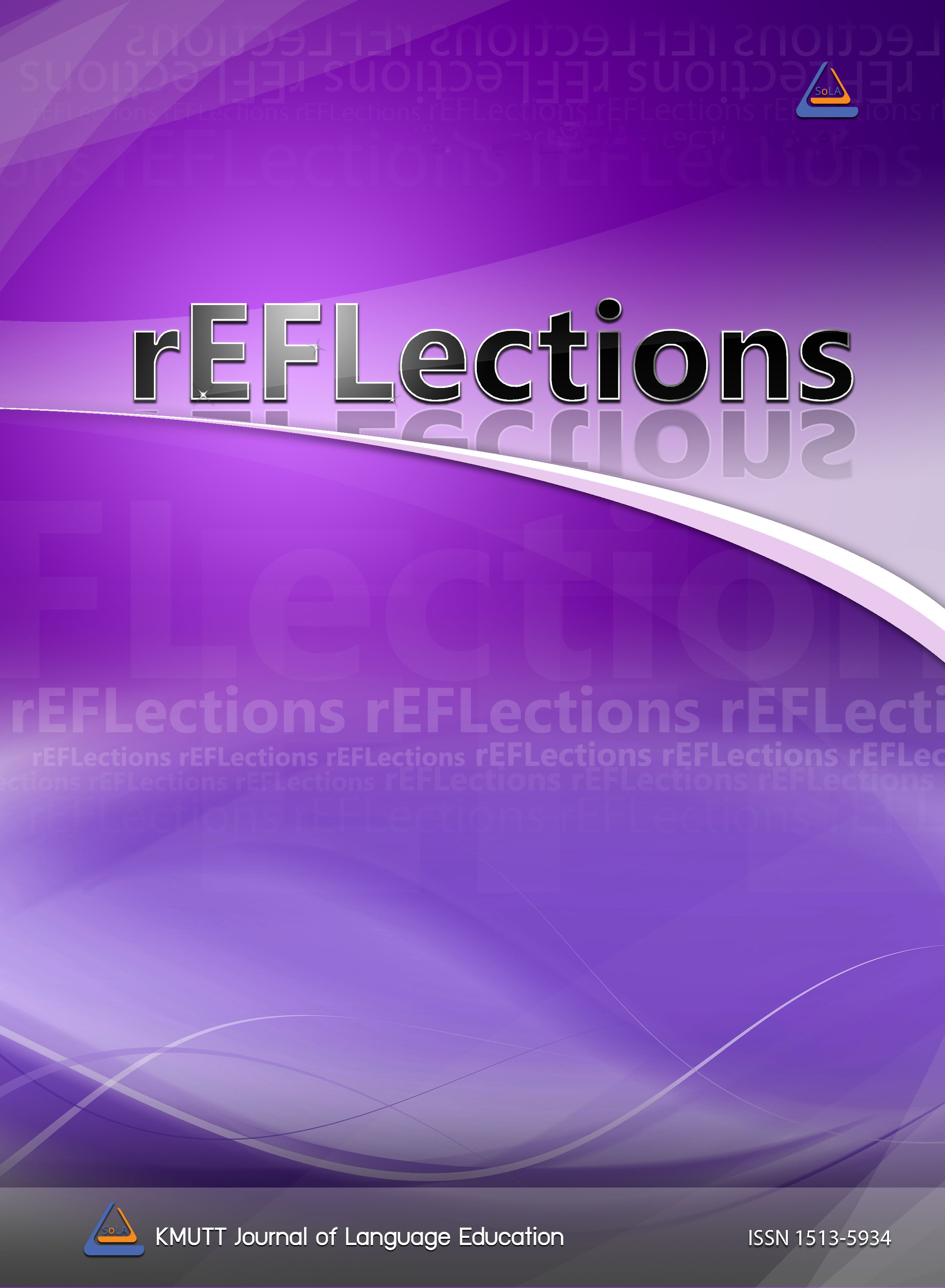Language and Leadership: Key Linguistic Attributes and Devices Reflecting Charismatic Leadership of King Rama IX of Thailand *Featured Article*
Main Article Content
Abstract
Effective communication is one of the most important factors bringing about people’s confidence in the information and its source. Most charismatic leaders employ some particular rhetorical devices to gain people’s trust with the ultimate goal of bringing peace and prosperity to the nation. The present study aimed at extracting some linguistic devices and attributes in relation to roles of leaders from speeches delivered by King Rama IX—one of the most significant and respectful leaders of Thailand. Data were speeches of HM the King given from 1974 to 1999 on the occasion of the royal birthday anniversaries. Qualitatively, types of attributes and linguistic devices were proposed while frequencies of occurrences of devices, together with frequencies per 1,000-word text, were quantitatively reported. Results found that King Rama IX’s studied speeches comprised three attributes—[HUMBLENESS], [PERSUASIVENESS] AND [SOLIDARITY]—with eight major types of linguistic devices. The proposed attributes and devices were said to enhance confidence of Thai people on his leadership.
Article Details

This work is licensed under a Creative Commons Attribution-NonCommercial-NoDerivatives 4.0 International License.
References
Biber, D., & Conrad, S. (2009). Register, genre, and style. Cambridge University Press.
Bligh, M. C., & Robinson, J. L. (2010). Was Gandhi “charismatic”? Exploring the rhetorical leadership of Mahatma Gandhi. The Leadership Quarterly, 21, 844-855.
Conger, J. (1991). Inspiring others: The language of leadership. Academy of Management Executive, 5(1), 31-45.
Corbett, E. P. (1971). Classical rhetoric for the modern student. (2nd ed.). Oxford University Press.
Davis, K. M., & Gardner, W. L. (2012). Charisma under crisis revisited: Presidential leadership, perceived leader effectiveness, and contextual influences. The leadership Quarterly, 23, 918-933.
Fengjie, L., Jia, R., & Yingying Z. (2016). Analysis of the rhetorical devices in Obama’s public speeches. International Journal of Language and Linguistics, 4(4), 141-146.
Intravisit, A. (2005). The rhetoric of King Bhumibol’s sufficiency economy: Rhetorical analyses of genre and Burke’s dramatism of the December 4th speeches of 1997, 1998, 1999, and 2000. Retrieved on 19 Apr. 2020 from https://www.bu.ac.th/knowledgecenter/epaper/jan_june2005/apichart.pdf
Johnson, S. K., & Dipboye, R. L. (2008). Effects of charismatic content and delivery on follower task performance: The moderating role of task charisma conduciveness. Group & Organization Management, 33, 77-106.
Kassabova, I. (2020). A comparative rhetorical analysis of the speeches of Queen Elizabeth II after Princess Diana’s death and about the coronavirus crisis. Rhetoric and Communications, 44, 78-93.
Kjeldsen, J. E. (2019). Royal interventions in the public discourse on immigration: Rhetorical topoi on immigration in the New Year’s speeches of the Scandinavian monarchs. Jovnost: The Public, 1-16. https://doi.org/10.1080/13183222.2019.1587702
Matínez, D. F., & González, V. C. T. (2012). Obama and Bush: Their victory and non-victory speeches. ONOMÁZEIN, 25(1), 205-217.
Mavrodieva, I. (2020). A Comparative rhetorical analysis of the speeches of Queen Elizabeth II and King George VI. Rhetorical and Communications, 43, 56-67.
Mettomäki, A. (2017). “Yes we can” or “Make America Great again”: Comparison of representations of Barack Obama and Donald Trump’s inaugural addresses. [B. A. thesis, Department of Language and Communication Studies, University of Jyväskylä].
Mio, J. S., Riggio, R. E., Levin, S., & Reese, R. (2005). Presidential leadership and charisma: The effects of metaphor. Leadership Quarterly, 16, 287-294.
Nusartlert, A., & Chaijaroen, N. (2015). Language of power: Stylistic analysis of Thai society’s legal language, political language, media language and academic language: A stylistic analysis of Thai political language (รายงานวิจัยฉบับสมบูรณ์ โครงการภาษาแห่งอำนาจ: การวิเคราะห์วัจนลีลาของภาษากฎหมาย ภาษาการเมือง ภาษาสื่อ และภาษาวิชาการของสังคมไทย โครงการย่อยที่ ๒ การวิเคราะห์วัจนลีลาภาษาการเมืองไทย). Thailand Research Fund.
Prasithrathsint, A. (2015). Language of power: Stylistic analysis of Thai society’s legal language, political language, media language and academic language: A synthesis of language of power (รายงานวิจัยฉบับสมบูรณ์ โครงการภาษาแห่งอำนาจ: การวิเคราะห์วัจนลีลาของภาษากฎหมาย ภาษาการเมือง ภาษาสื่อ และภาษาวิชาการของสังคมไทย บทสังเคราะห์ภาษาแห่งอำนาจ). Thailand Research Fund.
Prasithrathsint, A., & Piyapasuntra, S. (2015). Language of power: Stylistic analysis of Thai society’s legal language, political language, media language and academic language: A stylistic analysis of Thai academic language (รายงานวิจัยฉบับสมบูรณ์ โครงการภาษาแห่งอำนาจ: การวิเคราะห์วัจนลีลาของภาษากฎหมาย ภาษาการเมือง ภาษาสื่อ และภาษาวิชาการของสังคมไทย โครงการย่อยที่ ๔ การวิเคราะห์วัจนลีลาภาษาวิชาการไทย). Thailand Research Fund.
Ren, H. (1991). English rhetoric: An introduction. Shanghai Foreign Language Education Press.
Thamrongsanti, T. (2018). Post-modernism in wisdom of King Rama 9 (กระบวนทัศน์หลังสมัยใหม่นิยมในพระอัจฉริยภาพของพระบาทสมเด็จพระปรมินทรมหาภูมิพลอดุลยเดชบรมนาถบพิตร). Journal of Humanities and Social Sciences, Rajabhat Surat Thani University, 10(3), 29-62.
Tchaparian, V. (2016). A critical analysis of speeches by President Vladimir Putin and President Barack Obama concerning the Crimean events. Arts and Humanities in Higher Education, 1-2(20), 31-38.
Winterowd, R. (1965). W. R. rhetoric and writing. Allyn and Bacon.
Wesphada, T. (2006). Rhetoric of wisdom in royal speech and guidance of King Rama 9 (วาทศิลป์แห่งปัญญาในพระราชดำรัส และพระบรมราโชวาทของพระบาทสมเด็จพระเจ้าอยู่หัว). In Somkiat Rakmanee (Ed). A collection of Thai language articles in honor of King Rama 9 reign for 60 years (หกสิบปีกระเดื่องหล้า ประเลงสวรรค์: รวมบทความทางภาษาไทยเฉลิมพระเกียรติพระบาทสมเด็จพระเจ้าอยู่หัวทรงครองราชย์ครบ ๖๐ ปี). Teachers Council Publishing House.
Yameng, L. (2004). Pursue the power of symbolic means: Reflections on western rhetorical thought. Xinshi Sanlian Bookstore.


